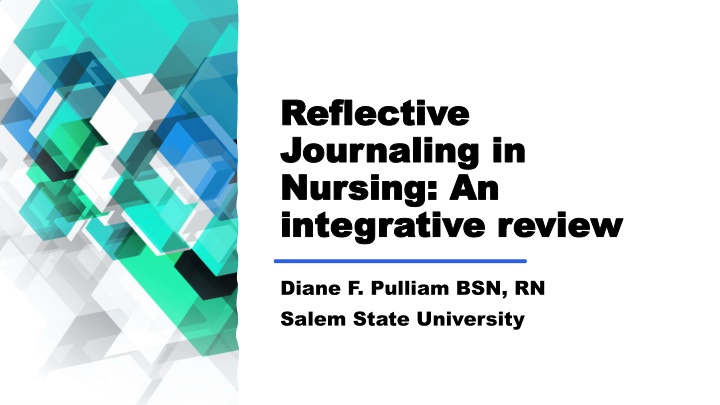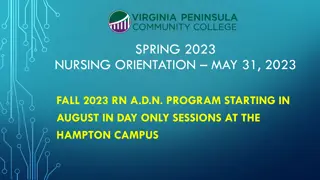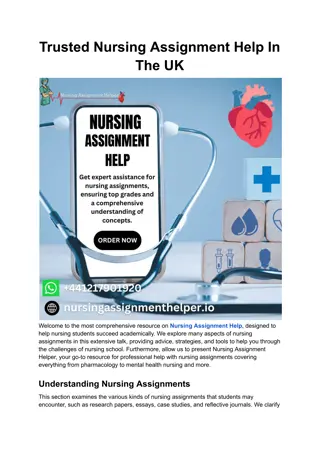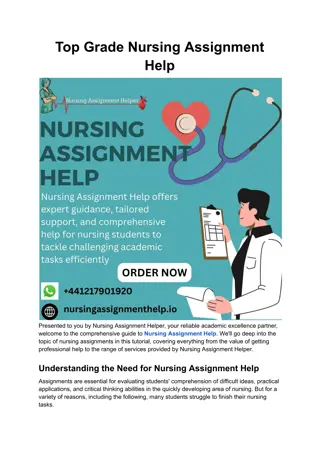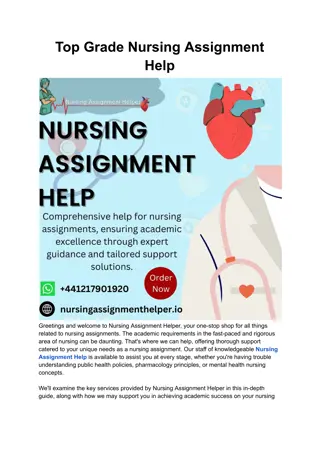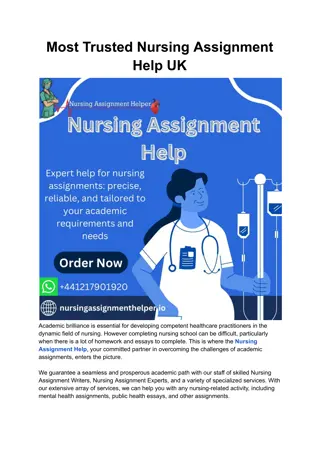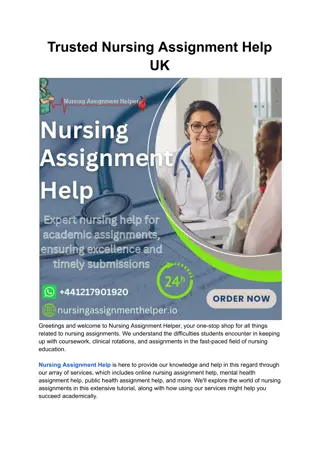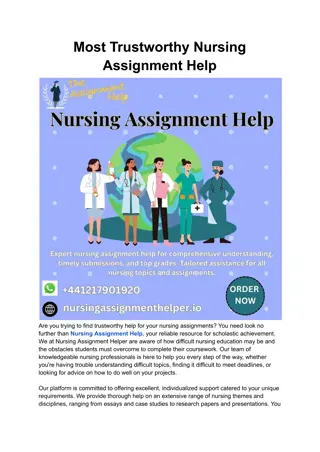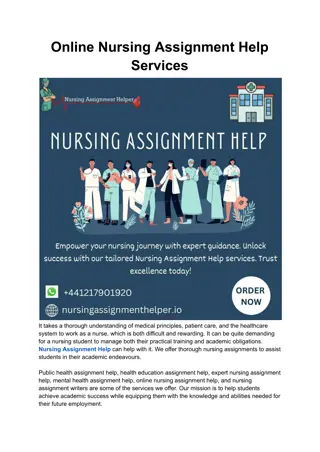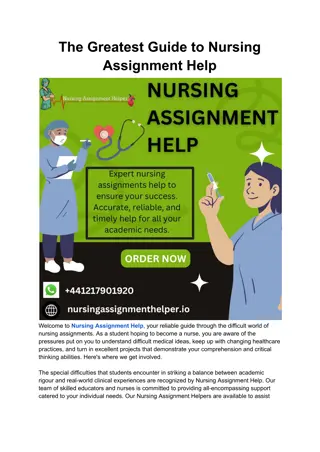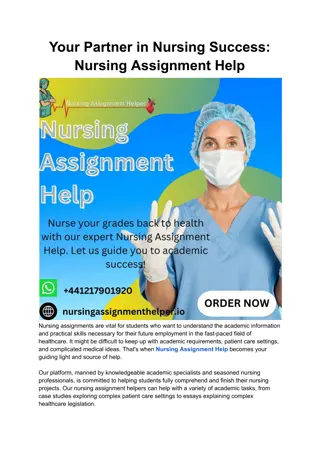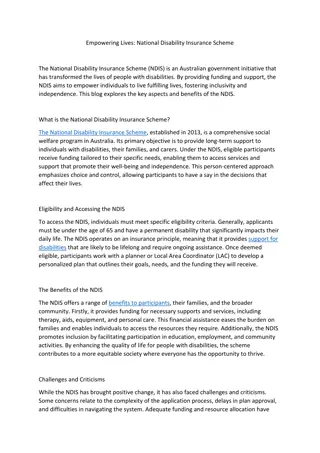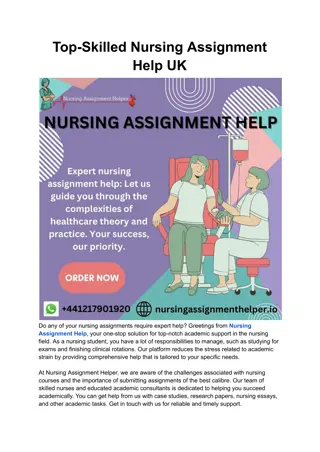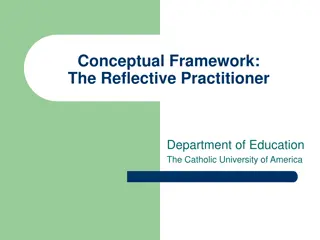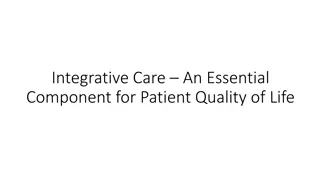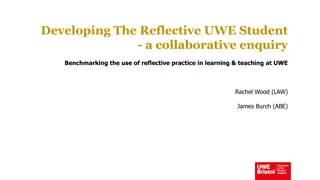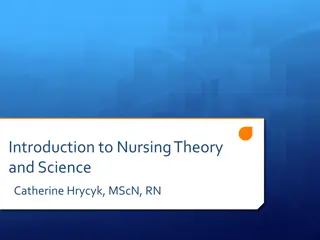Reflective Journaling in Nursing: An Integrative Review
Nursing educators advocate for reflective journaling as a tool to enhance critical thinking in nursing students and novice nurses. This integrative review explores the significance of reflective journaling in bridging the theory-practice gap in nursing education, highlighting its benefits and challenges.
Download Presentation

Please find below an Image/Link to download the presentation.
The content on the website is provided AS IS for your information and personal use only. It may not be sold, licensed, or shared on other websites without obtaining consent from the author.If you encounter any issues during the download, it is possible that the publisher has removed the file from their server.
You are allowed to download the files provided on this website for personal or commercial use, subject to the condition that they are used lawfully. All files are the property of their respective owners.
The content on the website is provided AS IS for your information and personal use only. It may not be sold, licensed, or shared on other websites without obtaining consent from the author.
E N D
Presentation Transcript
Reflective Reflective Journaling in Journaling in Nursing: An Nursing: An integrative review integrative review Diane F. Pulliam BSN, RN Salem State University
Reflective journaling Introduction Nursing educators feel that reflective journaling might be an essential tool to promote critical thinking based on nursing students and novice nurses journal entries during clinical rotations. Reflective journaling is considered worthwhile for adult learners. It is considered a tool that can close the gap that exists between nursing theory and practice. (Langley, 2010)
Reflective journaling Background The perceptions that journaling promotes ways of gaining knowledge, developing critical thinking and clinical reasoning skills are positive and are pointed out by psychologists, philosophers, educators, and nursing students (Bussard, 2015). Reflective journaling is a way by which an individual expresses feelings, opinions, and thoughts about a life experience through writing and goes back to explore while using critical thinking and find better ways for future situations. (Bussard, 2015) John Dewey, one of the most influential educators of the 20thcentury, believed that experience is the source of learning and by reflecting on experiences that an individual encounters would create a connection between beliefs, thoughts, and actions. Dewey viewed experiential learning of practical life skills as crucial to education. (Oermann, 2018, et al., p 23). Thirty years ago, Donald Alan Sch n, a trained philosopher, published about reflective practice that triggers the use of reflective journaling in nursing as an important concept to nursing. (Langley, 2010).
Reflective journaling Background cont. In nursing education, it is understood that reflective journaling may be helpful not only to students but also to educators. It helps educators create a teaching strategy as a result of knowing how nursing students perceptions of a situation affect their learning and skills development. (Webster, 2010). Not all students feel comfortable using reflective journal to communicate their feelings, beliefs, thoughts, opinions with their educators while developing their professional growth and pursuing their goals as nurses (Zori, 2016) Some students view journaling as an invasion of privacy that creates some sort of a barrier to express themselves freely. self-disclosure in journal writing requires an atmosphere of mutual trust and privacy, free of the risk of negative consequences and the fear of jeopardizing academic goals (Langley, 2010, p16). The students also don t believe that their journals will not affect their grades. participants were advised that they could withdraw any time from the study without consequences in relation to grades or clinical rotation(Mirlashari, 2017).
Reflective journaling Method An integrative review is a fixed review method that summarizes literature research that has been done to provide a better understanding of a situation. It allows the inclusion of diverse methodologies and plays a major role in evidence-based practice in nursing ( Whittemore, 2005). This integrative review is to investigate how reflective journaling has been perceived as an important component of the of the nursing education to better prepare nursing students how to use their experience as a way of gaining knowledge for practice. Ten articles were reviewed to initiate the study about what is known regarding reflective journaling searching for differences and similarities based on the research surveys. Seven articles were chosen because they exclusively focused on nursing students, novice nurses, and educators gaining new knowledge through reflective journaling.
Reflective journaling Method cont. The articles consistent with using the terms: nursing, nursing students, nurse educators, reflection, reflective journaling, critical thinking, experience. The researchers method to gather data and obtain results are similar; they use pre and post surveys to gather data. The surveys were restricted to nursing experience at the designated clinical sites. All five articles use codes instead of students names during data analysis to prevent bias
Reflective journaling Results The research studies from the chosen articles have the same motif which is to explore the learners perceptions of certain nursing concepts through journaling. The common themes noted in the five articles include: Learning process Professional development Personal Growth Learning process Critical thinking skills
Reflective journaling Result cont. The research survey of the seven selected articles convince readers that reflective journaling is building its roots into the nursing education. One study found that nursing students prefer the reflective journaling method over written care plan to improve their thinking skills (Padden-Denmead, 2016). The authors of one of the articles states that engaging students in critical reflection through journaling is a well-accepted educational strategy within nursing education. (Wedgeworth, 2019, p1). Reflective journaling is an effective teaching learning strategy to identify students clinical judgement and development (Bussard, 2015) Students develop personal growth by demonstrating a change in their perceptions. For example, during a psychiatric clinical rotation some student have changed their negative attitude towards mentally ill patients (Wedgeworth, 2019)
Reflective journaling Result cont. Surprisingly, the clinical simulation combined with debriefing and guided reflective journaling shows student s willingness to accept journaling as part of their learning strategy. That survey evaluated 23 baccalaureate students journal entries after a simulation exercise with guided debriefing and after 2 subsequent clinical experiences. After simulation the students met for reflective debriefing for group discussions and the study results shows that students were able to achieve higher scores on CT proving that guided reflective debriefing , in addition to guided reflective journaling, can provide students with the opportunity to practice CT, reflect, and identify learning needs. (Padden-Denmead, et al., 2016 p650).
Reflective journaling Discussion All studies used survey tools specific to their studies to report their findings showing accuracy and the credibility of their research. Based on the articles different strategies for have been used to conduct the surveys hoping to find a better way to implement journaling in nursing education. The strategies include the use of: semi-guided journal assignment in addition to writing a pre-reflective course paper different high-fidelity scenarios during a medical-surgical nursing course to identify a teaching- learning strategy to assist prelicensure nursing students prior to graduation, in the development of clinical judgement. (Bussard, 2015) the combination of clinical simulation with debriefing and guided reflective journaling to stimulate CT reflective journaling, and face-to-face a weekly interviews with the clinical instructor.
Reflective journaling Recommendations All the authors acknowledge that more research is needed to show reflective journal s impact on clinical judgement, critical thinking in nursing. Feedback to students should be part of communication to show understanding and support to students. Reflective journaling have some participants worried about how their educator might evaluate their achievement in the program. Educators must eliminate the current style of reflective journaling assignment and offer full anonymity for students; using a drop off box to turn in their assignment. Using reflective journaling as a teaching strategy to promote critical thinking with the inclusion of simulation reflective debriefing will increase positive outcomes Simulation in combination with debriefing and guided reflective journal should be used to promote critical thinking skills, opportunities to practice clinical reasoning, professional growth development Debriefing or group discussion eliminates students fears because they feel comfortable listening to their classmates who have the same beliefs and opinions
Reflective journaling Conclusion The increased interest of utilizing reflective journaling as a teaching strategy is demonstrated in this integrative review. The research studies confirm that reflective journaling enhance critical thinking skills. One study reveals that most of the students found keeping a reflective journal is useful it gives them access to deeper layers of understanding it helped them to become more mindful of how they provided care for the patients and the family. (Mirlashari, 2017, p26).
Reflective Journaling References Bussard, M. E. (2014). Clinical Judgment in Reflective Journals of Prelicensure Nursing Students. Journal of Nursing Education, 54(1), 36 40. doi: 10.3928/01484834-20141224-05 C., D. G. J., Oermann, M. H., & Phillips, B. C. (2018). Teaching in nursing and role of the educator: the complete guide to best practice in teaching, evaluation, and curriculum development. New York, NY: Springer Publishing Company, LLC. Mirlashari, J., Warnock, F., & Jahanbani, J. (2017). The experiences of undergraduate nursing students and self-reflective accounts of first clinical rotation in pediatric oncology. Nurse Education in Practice, 25, 22 28. doi: 10.1016/j.nepr.2017.04.006
Reflective Journaling References cont. Padden-Denmead, M. L., Scaffidi, R. M., Kerley, R. M., & Farside, A. L. (2016). Simulation With Debriefing and Guided Reflective Journaling to Stimulate Critical Thinking in Prelicensure Baccalaureate Degree Nursing Students. Journal of Nursing Education, 55(11), 645 650. doi: 10.3928/01484834-20161011-07 Wedgeworth, M. L., Ford, C. D., & Tice, J. R. (2019). I m scared : Journaling Uncovers Student Perceptions Prior to a Psychiatric Clinical Rotation. Journal of the American Psychiatric Nurses Association, 26(2), 189 195. doi: 10.1177/1078390319844002 Zori, S. (2016). Teaching Critical Thinking Using Reflective Journaling in a Nursing Fellowship Program. The Journal of Continuing Education in Nursing, 47(7), 321 329. doi: 10.3928/00220124- 20160616-09
